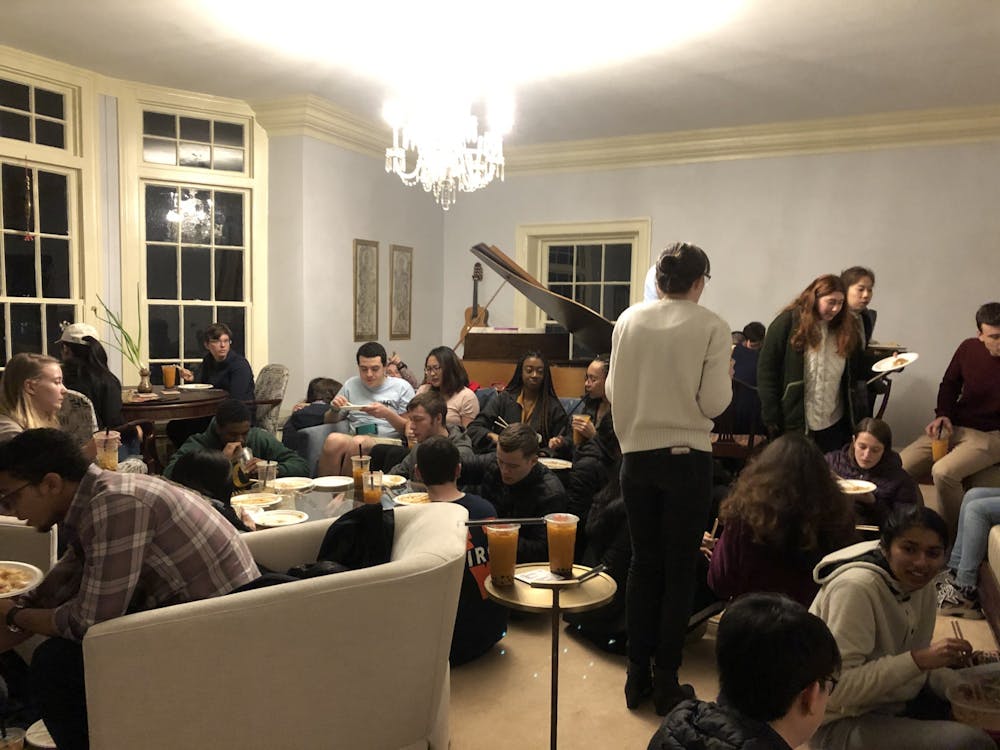On the eve of the Lunar New Year Saturday, a string of red lanterns lit up the path behind the International Residential College, culminating at the front steps of Big Morea — part of a two-section complex of Morea House — where Reid Bailey, IRC Principal and Systems Engineering Professor, lives with his family. There, Bailey, his wife and children welcomed students for an annual celebration of the Lunar New Year.
Lunar New Year, or Chinese New Year, celebrates the beginning of a new year in the lunar calendar, which is based on the monthly cycle of the moon. In China, Lunar New Year is commonly referred to as the Spring Festival because it occurs near the beginning of spring. It’s the country’s biggest festival of the year, as well as its longest public holiday, allowing for seven days of hearty food, celebration and family reunions.
The IRC event incorporated the fundamental components of any Lunar New Year celebration — food, red packets, well wishes and paper cutting — a form of Chinese art. Over 150 students attended the event throughout the night.
The event originated six years ago under Eric Loth, former IRC principal and current engineering professor, who started it in collaboration with an IRC resident. Since then, it has always been held in Big Morea. This was Bailey’s second time hosting the event.
“I always assumed ‘New Year’ was the same everywhere, right? And now we're celebrating it multiple weeks after we celebrated it here,” Bailey said. “Students [know that] there are lots of people in this world that celebrate New Year fundamentally different than [they] do. I think that's kind of its role here at the IRC … the contrast between what a student who's grown up in the United States can immediately sense by there being a new year that's not on Jan. 1.”
Graduate student Enrico Guffanti, an exchange student from Italy, has only lived in the IRC for the past two weeks so decided to attend the Lunar New Year celebration as a way to meet new people in a welcoming environment. Prior to attending the event, Guffanti knew very little about the Lunar New Year, which gave him the opportunity to experience a new cultural tradition.
“I just wanted to meet new friends,” Guffanti said. “I was just curious about the event, and [wanted to] see a different culture, different traditions and try new food. I think I know the food now that you would eat at events like this.”
During the Lunar New Year, people typically eat food like dumplings, fish, tangyuan (汤圆), spring rolls, nian gao (年糕) and noodles. Each food symbolizes good fortune for the new year, conveying wishes such as wealth, success and longevity. The food at the IRC celebration was catered by Got Dumplings and included rice and cold peanut noodles, as well as chicken, pork and tofu dumplings. The meal was complemented by Thai bubble tea. In addition to the catered food, Bailey and IRC residents David Xiao and Angeline Zeng bought snacks from C’ville Oriental, a nearby Asian supermarket. Snacks included sachima (沙琪玛) — a pastry made with fried batter resembling Rice Krispies — want want senbei (旺旺仙贝) — rice crackers — and want want ball cakes (旺旺小馒头).
“I wasn’t really familiar with the traditions of Lunar New Year, so this was really fun because I got to learn not only about writing wishes and sharing wishes with other people but also [about] tasting the different food and the dessert, especially because I've never had them,” first-year College student Juliette Laburthe said.
For many Chinese international students, this was their first time celebrating Lunar New Year away from home, but the atmosphere generated by the event was positive enough to bring back childhood memories.
“I felt a little bit sad because I really miss my family,” first-year College student Yolanda Yao said. “There’s this huge virus in China, so I’m really worried about them, but after this, I’m just much happier. They were doing this paper cutting [activity], which is what I used to do in kindergarten, and also they offered snacks that I used to eat as a child, so it brings a lot of memories back to me.”
The celebration included an activity involving red packets, which has always been an important component of the IRC event. Everyone who entered the house was asked to write down well wishes on a piece of paper and slip them into a red packet that was then placed in a big bowl. Upon leaving, each person was able to take a red packet and read the well wishes placed in their envelope.
Students were also given reusable chopsticks customized with the words “International Residential College” — a new addition to this year’s celebration, along with the paper cutting activity and snacks.
“I think that this event is really neat,” first-year Architecture student Anna Wei said. “This is my first time spending it away from my parents. I enjoyed all of the paper cutting, having conversations with other people to get to know more about the tradition and having good food and sharing a good time with friends.”
The walls, doors and ceilings of Morea House were adorned with Chinese decorations typical of the Lunar New Year. These included New Year couplets and hanging ornaments that symbolize wealth and fortune. Perhaps the only thing missing was the broadcast of the annual CCTV New Year’s Gala, which people in China watch on Lunar New Year’s Eve.
“It’s my first new year that’s away from home and my family,” Yao said. “But this community gives me a sense of belonging and a home away from home so that I can actually spend this Chinese festival here with my friends, and it actually feels really warm.”







